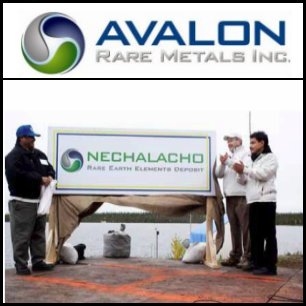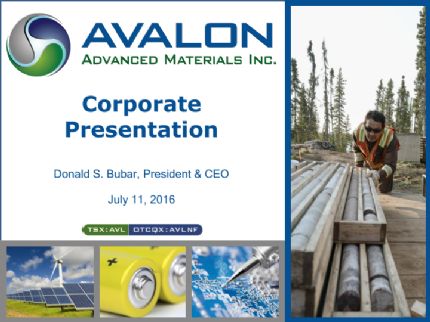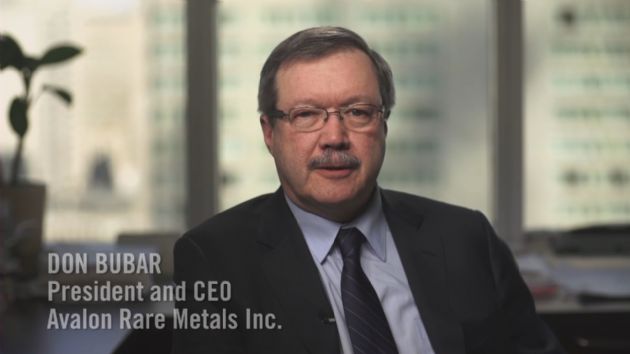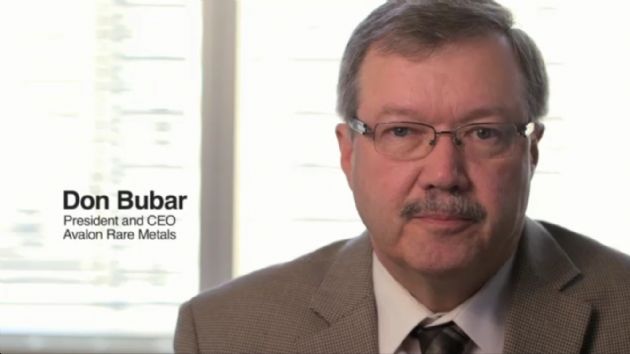
Avalon Rare Metals Inc. (TSE:AVL) Prefeasibility Study On The Nechalacho REE Deposit, Thor Lake, NWT, Confirms Positive Economics
Toronto, June 21, 2010 AEST (ABN Newswire) - Avalon Rare Metals Inc. ( TSE:AVL) (OTCQX:AVARF) is pleased to announce the results of a positive Prefeasibility Study ("PFS") on the Nechalacho Rare Earth Elements ("REE") deposit, Thor Lake NWT, Canada (the "Project"). The PFS was completed by independent consultants Scott Wilson Roscoe Postle Associates Inc. ("Scott Wilson RPA"). The results demonstrate with a high degree of confidence that the project development model as presently conceived is technically feasible and will provide satisfactory returns on invested capital with acceptable risk. The complete report will be posted on SEDAR by no later than July 29, 2010.
TSE:AVL) (OTCQX:AVARF) is pleased to announce the results of a positive Prefeasibility Study ("PFS") on the Nechalacho Rare Earth Elements ("REE") deposit, Thor Lake NWT, Canada (the "Project"). The PFS was completed by independent consultants Scott Wilson Roscoe Postle Associates Inc. ("Scott Wilson RPA"). The results demonstrate with a high degree of confidence that the project development model as presently conceived is technically feasible and will provide satisfactory returns on invested capital with acceptable risk. The complete report will be posted on SEDAR by no later than July 29, 2010.
Summary of Financial Analysis
The PFS covers all aspects of project development, including mining, mineral concentration, hydrometallurgical processing and all related infrastructure. Scott Wilson RPA developed a financial model from first principle capital quotations, estimates from suppliers, manufacturers, contractors and experience based on similar operations in Canada and abroad. The resulting discounted cash flow ("DCF") analysis summarized below shows a positive internal rate of return ("IRR") and a positive net present value ("NPV") by applying a range of discount rates on both a pre-tax and after-tax basis. The net cash flow is based on an 18 year operating schedule. The CAD/USD exchange rate was assumed to be CAD$1.00 = USD$0.90. The financial model assumes 100% equity financing, although the Company plans to pursue various financing options upon completion of a bankable feasibility study.
--------------------------------------------Financial Analysis Pre-Tax After-Tax (CAD $) (CAD $)IRR 14% 12%--------------------------------------------Net Cash Flow $2.1 billion $1.5 billionNPV @ 5% $826 million $540 millionNPV @ 8% $428 million $236 millionNPV @ 10% $246 million $97 million--------------------------------------------
Total Project construction capital costs inclusive of a 22% contingency were estimated at CAN $899.7 million. Of the total capital costs, the mine, mill and hydrometallurgical plant capital comprises CAN $589.3 million while the remaining costs include contingency, sustaining capital, reclamation and Engineering, Procurement, Construction and Management ("EPCM"). Average operating costs over the 18 year life of the Project are estimated to average CAN $267 per tonne of ore mined or $5.93 per kilogram of product. The 18 year mine life is based on a National Instrument 43-101 compliant Probable Mineral Reserve estimate of 12.0 million tonnes of 1.70% TREO(1), 3.16% zirconium oxide (ZrO2), 0.41% niobium oxide (Nb2O5) and 0.041% tantalum oxide (Ta2O5). Combined recoveries of TREO, ZrO2, Nb2O5 and Ta2O5 are 84.6% from the flotation plant and 90% from the hydrometallurgical plant. All four products will be concentrated together and are only isolated into individual products in the final stages of the hydrometallurgical process and therefore, their recovery costs have been aggregated. Expected revenues are based on the following average price assumptions in USD per kilogram: TREO = $21.94, ZrO2 = $3.77, Nb2O5 = $45.00, Ta2O5 = $130.00. Some of the price assumptions used are above current prices, based on independent third-party long term forecasts.
Financial analyses prepared for pre-feasibility studies are designed to determine if, after applying conservative assumptions on costs and revenues, the project stands up as an economically viable development opportunity. In this regard, management is pleased that, despite a higher capital cost estimate than previously anticipated, the DCF analysis yielded positive results. Sensitivity analyses demonstrate that profitability is most sensitive to total revenue, exchange rate, operating costs and the metals prices. Commented President Don Bubar, "We have reviewed our consultants' work carefully and we are satisfied that they have been extremely thorough in their analysis of the project and have not applied any overly optimistic assumptions in developing this economic model."
Project Development Model
The development model proposed for the project has two site components: an underground mine and flotation plant ("Nechalacho Mine and Flotation Plant site"), to be located at the Thor Lake Property 100 kilometres southeast of Yellowknife, NWT, and a hydrometallurgical plant ("Hydrometallurgical Plant site") to be located at another site closer to existing transportation and energy infrastructure. The PFS contemplates an existing brownfield site for the hydrometallurgical facility at the former Pine Point Mine, 85 kilometres east of Hay River, NWT on the south shore of Great Slave Lake, as its base case.
Construction would begin 24 to 30 months prior to operations, and reclamation activities will commence following cessation of all operations and continue for a period of approximately three years.
Rare earth elements ("REE") along with associated zirconium, niobium and tantalum will be mined underground from the Nechalacho deposit. A decline ramp (15% ramp grade) will be utilized to access the ore zone located at approximately a 200 metre depth. Initial production will be approximately 1,000 metric tonnes per day ("tpd") and ramp up to 2,000 tpd in Year Four. At this rate, approximately 12 million tonnes of Probable Mineral Reserves would be mined from the Basal Zone of the Nechalacho deposit over a period of approximately 18 years of operations. Mining will be conducted with a first pass of primary stopes, followed by pillar extraction after the primary stopes have been cement paste backfilled.
Rubber-tired mechanized equipment will be utilized to provide maximum flexibility. Primary crushing will be completed underground and crushed ore and waste rock will be conveyed to the surface.
The process to produce the REE concentrate will involve conventional grinding, crushing and flotation techniques. Processing facilities will include a Flotation Plant that will produce a high-grade concentrate that will be barged off-site to the proposed Hydrometallurgical Plant site for secondary processing. A tailings management facility will be located up-slope from the Flotation Plant and northeast of Thor Lake in a local catchment area.
The Nechalacho Mine infrastructure will include a 150 person camp, 1,000 metre airstrip, diesel power generation for a maximum average consumption of 8.4 megawatts ("MW") at 2,000 tpd, administration, maintenance, warehouse and concentrate loading and storage to accommodate an initial 180 tpd of concentrate (at 1,000 tpd). All concentrates will be loaded into bulk transport containers, hauled to the seasonal dock facility along the north shore of Great Slave Lake and barged during the summer to the Hydrometallurgical Plant located approximately eight kilometres from the south shore of Great Slave Lake.
The Hydrometallurgical Plant will further process the REE concentrates from the Nechalacho Mine and Flotation Plant utilizing a flowsheet developed under the direction of consulting metallurgist, J.R. Goode, P.Eng. The process will include acid baking, caustic cracking, water washing, filtration, caustic regeneration and evaporation, double salt precipitation, solvent extraction and product drying to produce direct ship products. The proposed hydrometallurgical tailings facility will be an engineered facility located within the existing tailings facility that remains from the historic Pine Point Mine lead-zinc mining operation. Using this location offers some significant potential benefits in terms of reduced environmental impacts, operational efficiencies and enhanced economic benefits for the Northwest Territories, however other alternatives in southern Canada remain to be considered.
The Hydrometallurgical Plant as presently conceived will bus employees from either Hay River or Fort Resolution on a daily basis. On average, approximately 7.3 MW of power is required for the Hydrometallurgical Plant which will be supplied by excess hydroelectric power from the Taltson Dam most of the year except during winter when supply is limited to about 6 MW and the remainder will be generated by diesel power. Additional supplemental and replacement energy alternatives are being investigated to include, wind, solar, biomass and geothermal power. Local infrastructure will include administration, maintenance, warehouse and product loading facilities capable of packaging and shipping up to 80 tpd of rare metal products 85 kilometres along an all season highway to a railhead facility located in Hay River, NWT.
Avalon has developed a critical path project schedule to estimate a possible start date for full capacity production in 2015. Construction activities are predicted to last 24 to 30 months. The start of construction is assumed to be in 2013 upon receipt of land and water permits and financing. The schedule assumes that the issuance of permits, financing and delivery of equipment are the only external constraints that could modify the current schedule. This schedule is illustrated in chart form at:
http://www.avalonraremetals.com/projects/thor_lake/prefeasibility_study/.
Also, Avalon would like to recognize its Northern Aboriginal partners for their constructive feedback and advice on minimizing environmental impacts and for input on our mine development decisions. We value our relationship with all our Northern communities and look forward to continuing positive future discussions on partnerships and collaborative business opportunities.
A detailed Project Description Report filed in connection with the project permitting process can be found on the Mackenzie Valley Land and Water Board's public registry site at www.mvlwb.com.
Resources and Reserves
An updated Indicated and Inferred mineral resource estimate was prepared by Scott Wilson RPA and disclosed in the Company's news release dated June 14, 2010. The summary table of resources from this release is reproduced below for convenience but the reader is referred to the June 14, 2010 news release for more complete disclosure of the resource estimation methodology employed and other relevant context.
------------------------------------------------------Tonnes % % % % ppm ppm (millions) TREO HREO HREO ZrO2 Nb2O5 Ga2O3 Ta2O5------------------------------------------------------Basal ZoneIndicated 14.48 1.82 0.40 3.38 0.437 144 430Inferred 76.87 1.60 0.33 3.14 0.443 134 413------------------------------------------------------Upper ZoneIndicated 6.89 1.45 0.17 1.86 0.286 175 194Inferred 99.06 1.29 0.12 2.44 0.364 172 210------------------------------------------------------TotalInferred 175.93 1.43 0.21 2.74 0.399 155 298------------------------------------------------------
Notes:
1. CIM definitions were followed for Mineral Resources.
2. Mineral Resources are estimated using price forecasts for 2014 for rare earth oxides (US$21.94/kg average), zirconium oxide (US$3.76/kg), tantalum oxide (US$130/kg) and niobium oxide (US$45/kg), which are significantly above current prices.
3. Mineral Resources are estimated using a Net Metal Return cut-off value of CAD$260/tonne.
4. Resource densities in the block model are interpolated values averaging 2.87 t/m3.
Probable Mineral Reserves were estimated by Scott Wilson RPA as summarized below. The Probable Mineral Reserves represent that portion of the Indicated Resources in the Basal Zone that are included in the Mine Development plan. Dilution included in the reserves has been calculated using values below the cut-off value which resulted in an overall dilution of 15%.
Note: Details of individual REE grades in the Probable Mineral Reserves along with a plan of the reserves and other relevant information are posted on the Avalon website.
---------------------------------------------------------- Tonnes % % % % % (millions) TREO HREO ZrO2 Nb2O5 Ta2O5----------------------------------------------------------Probable MineralReserves 12.01 1.70 0.38 3.16 0.41 0.041----------------------------------------------------------
Notes:
1. CIM definitions were followed for Mineral Reserves.
2. Mineral Reserves are estimated using price forecasts for 2014 for rare earth oxides (US$21.94/kg average), zirconium oxide (US$3.76/kg), tantalum oxide (US$130/kg) and niobium oxide (US$45/kg), which are significantly above current prices.
3. Mineral Reserves are estimated using a Net Metal Return cut-off value of CAD$260/tonnes.
4. Indicated Mineral Resources are inclusive of Mineral Reserves.
Production
Avalon's Hydrometallurgical Plant will produce four (4) saleable products in hydrated oxide form - a total rare earth oxide, a zirconium oxide, a niobium oxide and a tantalum oxide. These products will be packaged in sealed drums or bulk bins for truck transport to Hay River, NWT. Canadian National Rail owns a railhead facility immediately outside Hay River which would be utilized to ship these products directly to customers.
At full production the Hydrometallurgical Plant will have an annual output averaging close to 10,000 tonnes TREO, 18,000 tonnes ZrO2, 1,700 tonnes Nb2O5 and 100 tonnes Ta2O5. It is important to realize that the tantalum, niobium and zirconium production does not involve significant extra costs as they occur in the same mineral phases that contain the heavy rare earths (zircon and fergusonite). They go into solution along with the rare earths and will be separately recovered so that they do not report to the REE product.
Rates of recovery for each of these products are estimated as follows:
------------------------------------------Product Flotation Plant HydroMet Plant Recoveries Recoveries------------------------------------------TREO 79.5% 93.0%Zirconium (ZrO2) 89.7% 90.0%Niobium (Nb2O5) 68.9% 80.0%Tantalum (Ta2O5) 63.0% 50.0%Combined Recovery 84.6% 90.0%------------------------------------------
Capital & Operating Cost Estimates
The estimated total capital costs for the Project are summarized as follows and are inclusive of engineering, construction and management. Over 80% of the capital is allocated for start-up and an additional 8% is allocated after year four for expansion to 2,000 tpd:
--------------------------------------------------------Activity Total Capital Cost Estimates (CAD $ 000's)--------------------------------------------------------Nechalacho Mine 99,607Thor Lake Processing Facility 173,165Hydro Metallurgical Plant 316,602--------------------------------------------------------Primary Project Component Cost 589,374--------------------------------------------------------Project EPCM 80,657Contingency @ 22% 144,503Sustaining Capital 73,000Reclamation and Miscellaneous 12,200--------------------------------------------------------Total Project Capital Costs 899,734--------------------------------------------------------
The operating costs for the Thor Lake Project have been calculated from first principles based on actual quotations where possible, and from other similar scale projects in Canada and elsewhere. The mine production is planned to ramp up over a four year period from 1,000 tpd for the first three years increasing to 2,000 tpd after Year Four. Operating costs will be higher at the lower production rate and have been calculated at an all inclusive $311 per milled tonne. Total operating costs at full production are expected to be $255 per milled tonne for a total average operating cost over the life of the Project of $267 per milled tonne.
Rare Metals Markets and Prices
The Nechalacho deposit contains a number of recoverable elements, the most significant being REE. In addition, niobium, zirconium and tantalum will be recovered. Gallium may also be recovered at a later stage. At the prices assumed for this PFS, the rare earths represent 56% of the anticipated total project revenues while niobium, zirconium and tantalum represent 44%. Niobium and zirconium make up about 20% each and tantalum represents approximately 3% of total project revenues.
Global demand for REE grew by 18% between 2006 and 2008 according to BCC Research, but softened in 2009 to below 2007 levels due to the effects of the worldwide recession. Demand has already shown signs of recovery and is expected to continue its pre-recession trend and grow at a compounded average growth rate of just over 9% between 2009 and 2014. Industrial Minerals Company of Australia ("IMCOA") forecasts demand (in terms of actual sales) to be 192,500 metric tonnes in 2014.
It should be noted that high demand for the less available heavy rare earth elements, europium through lutetium plus yttrium ("HREE"), (particularly dysprosium europium, and terbium) is expected to exert greater pressure on prices for these specific elements. The Nechalacho deposit contains an unusually high concentration of HREE, with HREE comprising over 20% of its total rare earth element content.
IMCOA forecasts that because of the imbalance in the primary distribution of the REE a total of 205,000 tonnes of total rare earth production will be required in 2014 to meet the demand for the HREE and neodymium (implying that some lanthanum and cerium production would be in excess of demand). China will continue to be the dominant producer, but new projects in the US, Australia, and Canada, will be needed to narrow the gap between demand and supply especially for the HREE.
A pricing model for the REE was developed by Avalon's consultants to take into account these supply/demand factors and the nature of the mixed REE product that will be produced by the hydrometallurgical facility. The methodology used for developing REE price assumptions for the PFS involved first calculating a "representative" price for individual rare earth oxides in China, then estimating future price appreciation inside China to 2014 from various price forecasts. Then a 2014 "outside China" price was estimated by including a portion of the VAT and tariffs currently applied to exported product.
Finally, a formula was created to link concentrate pricing to prices for individual rare earth oxides resulting in an average price assumption of US$21.94/kg TREO for Avalon's mixed total rare earth oxide concentrate.
The model assumes that Avalon concentrate will be sold or toll-processed at one or more separation plants outside China which will be established before 2014. For the bankable feasibility study Avalon will evaluate if it should participate in the establishment of such a separation plant outside of China. Product sales volumes used in the PFS were supported by letters of interest from two potential customers. For the bankable feasibility study, Avalon anticipates having product off-take arrangements in place.
Avalon's market share of total rare earth demand is conservatively forecast to be less than 3% initially at a 5,000 tonnes/year TREO production rate, and then less than 5% at a 10,000 tonnes/year TREO production rate. Initial market share for certain more valuable individual HREE, such as dysprosium and terbium, is estimated at 8% and 6% respectively. Estimated production volumes for individual rare earths are provided in the following table:
---------------------------------------RE Oxide Tonnes Per Tonnes Per Annum Annum (5,000 tpa) (10,000 tpa)---------------------------------------Lanthanum 792 1,583Cerium 1,786 3,572Praseodymium 226 451Neodymium 892 1,783Samarium 196 391Europium 25 49Gadolinium 186 371Terbium 27 54Dysprosium 136 271Holmium 24 48Erbium 63 126Thulium 9 17Ytterbium 51 101Lutetium 7 14Yttrium 585 1,169---------------------------------------Total 5,000 10,000---------------------------------------
The niobium pentoxide price assumption of US$45 per kilogram is based on a representative current price escalated for inflation and for the expected increase in steel demand. The price assumptions of US$3.77 per kilogram for zirconium oxide and US$130 per kilogram for tantalum oxide are based on a representative current price, escalated for inflation.
Discussion
Avalon has identified many opportunities to further optimize the Project's economics and add to the mineral resources on the property. Additional work by Avalon and third party consultants/contractors will be ongoing to develop a bankable feasibility level technical report upon which to obtain financing for eventual construction and start-up of operations. Additional opportunities identified by Avalon to reduce costs and/or timelines to full production include:
- Higher production rates and/or a shorter ramp-up period may be justified if future demand forecasts prove conservative. Production rates are only limited by the size of the available market, not the size of the mineral resource.
- Selective mining of higher grade sub-zones after start-up would increase revenues in the early years of production.
- Lower energy costs through reduced use of diesel power with the potential availability of more hydro power from the Taltson River Dam and availability of renewable energy alternatives such as wind, solar, biomass and geothermal.
- Alternative hydrometallurgical plant locations in southern Canada offer potential for significant cost savings, as recently confirmed through an internal review.
- Higher product demand and pricing (for which there is virtually universal agreement) due to emerging new clean technologies.
- Improved metallurgical recoveries and more economical processes in the flotation plant and hydrometallurgical plant.
- Reduction of the long-term royalty burden through buy-outs.
- Additional by-product revenues from gallium extraction.
Finally, the Thor Lake property offers much untested exploration potential. The Nechalacho deposit remains open for expansion and, as discussed in the Company's news releases dated May 12, 2010 and June 14, 2010, additions to the resource estimates, and re-classification of parts of the current Inferred Resources, are anticipated once all the results from the winter drilling are incorporated into the block model. Further, other rare metal mineralized zones such as the satellite T-Zone deposit are known to exist on the property and the Company's geological model predicts that other such satellite deposits enriched in other rare metals could be expected to occur elsewhere on the property. Commented Vice-President, Exploration Bill Mercer, "Less than 10% of the property has been drill-tested to date and the Company contemplates a long-term exploration program to add to our resource inventory and make more new discoveries in this truly remarkable rare metals mineralized system."
Qualified Persons
Jason Cox P.Eng., Supervisor of Mine Engineering, Christopher Moreton PhD, P.Geo. (Ontario and New Brunswick), and Don Hains P.Geo. (Ontario) of Scott Wilson RPA, and J.R. Goode, P.Eng, Consulting Metallurgist, are Qualified Persons as defined by National Instrument 43-101 and have verified that the technical information in this news release accurately reflects the technical information in the PFS.
Investor Call
The management of Avalon will be hosting an investor call to discuss the results of this prefeasibility study and to provide an opportunity for questions and answers on Tuesday, June 22, 2010 from 10 a.m. to 11 a.m. Eastern Time. To participate please dial-in at:
Local / International: +416-849-2698
North American Toll- Free: +1-866-400-2270
A full transcript of the call will be available on the Company's website at least 48 hours after the call.
(1) Total Rare Earth Oxides (TREO) refers to the elements lanthanum to lutetium, plus yttrium, expressed as oxides. See Avalon's website for conversion factors from elements to oxides. Heavy Rare Earth Oxides (HREO) refers to the elements europium to lutetium, plus yttrium, expressed as oxides. Light rare earths (LREO) refers to the elements lanthanum to samarium, expressed as oxides. HREO/TREO refers to the proportion of heavy rare earth oxides as a percentage of the total rare earth oxide content of the rock.
About Avalon Advanced Materials Inc
 Avalon Advanced Materials Inc. (TSE:AVL) (OTCMKTS:AVLNF) (formerly Avalon Rare Metals) is a Canadian mineral development company specializing in niche market metals and minerals with growing demand in new technology. The Company has three advanced stage projects, all 100%-owned, providing investors with exposure to lithium, tin and indium, as well as rare earth elements, tantalum, niobium, and zirconium. Avalon is currently focusing on its Separation Rapids Lithium Project, Kenora, ON and its East Kemptville Tin-Indium Project, Yarmouth, NS. Social responsibility and environmental stewardship are corporate cornerstones.
Avalon Advanced Materials Inc. (TSE:AVL) (OTCMKTS:AVLNF) (formerly Avalon Rare Metals) is a Canadian mineral development company specializing in niche market metals and minerals with growing demand in new technology. The Company has three advanced stage projects, all 100%-owned, providing investors with exposure to lithium, tin and indium, as well as rare earth elements, tantalum, niobium, and zirconium. Avalon is currently focusing on its Separation Rapids Lithium Project, Kenora, ON and its East Kemptville Tin-Indium Project, Yarmouth, NS. Social responsibility and environmental stewardship are corporate cornerstones.
| ||
|







